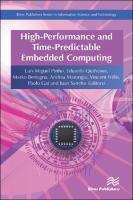High Performance Embedded Computing
Proposal review
Contributor(s)
Pinho, Luis Miguel (editor)
Quinones, Eduardo (editor)
Bertogna, Marko (editor)
Collection
EU collectionLanguage
EnglishAbstract
Nowadays, the prevalence of computing systems in our lives is so ubiquitous that we live in a cyber-physical world dominated by computer systems, from pacemakers to cars and airplanes. These systems demand for more computational performance to process large amounts of data from multiple data sources with guaranteed processing times. Actuating outside of the required timing bounds may cause the failure of the system, being vital for systems like planes, cars, business monitoring, e-trading, etc. High-Performance and Time-Predictable Embedded Computing presents recent advances in software architecture and tools to support such complex systems, enabling the design of embedded computing devices which are able to deliver high-performance whilst guaranteeing the application required timing bounds. Technical topics discussed in the book include: Parallel embedded platforms Programming models Mapping and scheduling of parallel computations Timing and schedulability analysis Runtimes and operating systemsThe work reflected in this book was done in the scope of the European project P SOCRATES, funded under the FP7 framework program of the European Commission. High-performance and time-predictable embedded computing is ideal for personnel in computer/communication/embedded industries as well as academic staff and master/research students in computer science, embedded systems, cyber-physical systems and internet-of-things.
Keywords
Computer architecture and logic design; EnergyDOI
10.1201/9781003338413ISBN
9781000794687, 9781003338413, 9788793609693, 9781000794687Publisher
Taylor & FrancisPublisher website
https://taylorandfrancis.com/Publication date and place
2018Grantor
Imprint
River PublishersClassification
Computer architecture and logic design
Energy


 Download
Download